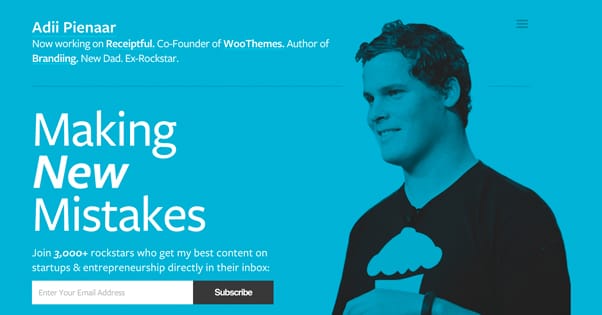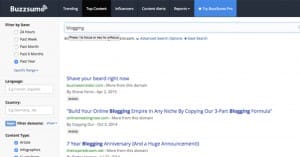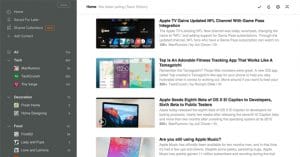16 Expert Tips for New Bloggers and Content Marketers
Published by James Parsons • Content Marketing • Posted November 22, 2015 ContentPowered.com
ContentPowered.com
It’s easy to set up a blog and start blogging, but it’s very difficult to break into the blogging industry. There are hundreds of thousands of blogs out there with no readership, no plan, no editorial focus; just personal blogs with whatever the author feels like posting at the time. Now, there’s nothing wrong with this, but it’s not a way to turn blogging into any sort of career. If you want to make a living as a content marketer or blogger, you need to put a lot more care, attention, and focus into your content.
On the plus side, there are hundreds of prominent bloggers out there who are more than willing to give advice to no1vice bloggers looking to get started. On the minus side, those bloggers have published an absolute ton of content and it’s difficult to sort through it all to find the nuggets of pure wisdom most helpful to new bloggers.
That’s what this post is all about; pulling out that value and giving it to you. I’ve compiled some excellent wisdom from prominent bloggers and marketers, to help you succeed as a newcomer to the blogging arena.
1. Dave Larson: Use Your Audience as Idea Generators
Dave’s exact quote is to “Create blog posts that answer the most interesting questions from people you engage with on social media.” This is a great strategy for new bloggers who haven’t compiled huge lists of content ideas to use over the years. The trouble is, you need to have enough prominence to have an audience that comments, and makes comments that can be leveraged into new content. This can be tricky for new bloggers, because it takes a little while to get around to having that kind of audience.
However, this does have a fringe benefit; it allows you to engage with your readers and build a community very quickly. By monitoring comments, you’re right there and ready to respond when one is made. When you respond, you engage readers. When you then take their suggestions, they feel special, and they’re more likely to keep reading, share posts, and recommend you to their friends.
2. Adii Pienaar: Write to Your Passions
Adii says “Write for yourself first & foremost. Ignore the fact that anyone else will read what you write; just focus on your thoughts, ideas, opinions and figure out how to put those into words.”
This is excellent advice, with one caveat; you need to pick a topic with at least some general appeal. You may be very passionate about plumbing valves, but very few people also care about it, so it’s not going to be a niche where you can make any sort of monetary returns.
The primary benefit to writing about something you’re passionate about is that you have more motivation to write. It’s not work to keep up with the industry, you’re already doing it as a hobby or for fun. You find yourself wanting to write more often, and that helps you keep up a publication schedule.
3. Nate Kontny: Have a Great Call to Action
Nate’s advice is to “Finish your blog post with some kind of call to action to signup for an email list or follow you on Twitter.” His full comment is longer, but it just gives context to why he decided to focus on CTAs, and how effective they were.
Essentially, what this boils down to is blog with a purpose. Always have some goal in mind. Have something for readers to do that can help you. Some options include:
- Follow you on Twitter or Facebook. More social follows means more exposure.
- Sign up for your mailing list. An email list is a great, Google-independent means of getting and keeping traffic.
- Buy copies of your ebook, or claim free copies in exchange for something else. Of course, you have to actually produce an ebook first.
The key is to include your CTA in the text of the posts you write, typically near the end. Users mostly ignore sidebars and banner ads, and social buttons are more of a design element than a useful CTA in themselves.
4. Neil Patel: Blog Consistently
Neil’s advice is simple: “Consistency is one of the most important things that bloggers tend to forget. It’s much easier to lose your traffic than it is to build it up, so make sure you consistently blog.”
Think about it; when you’re watching a TV show, you like to tune in at the same time every week, right? Imagine if one week it was 9 pm on Thursday, and the next week it was 8pm on Tuesday, and the week after that it didn’t air at all. A week later it shows up at 3 pm on Saturday, then they air three episodes in a row on the following Friday. You wouldn’t be able to keep up and you’d give up watching, right? Or just sigh and decide to catch it on Netflix a year later.
Blogging works the same way. When you’re consistently posting the same days every week, people start to expect posts. They want to read what you have to say, and they know when they can find more, so that’s when they check.
You don’t have to schedule your posts down to the exact half hour, but you certainly can. Various blogging tools, including basic WordPress, allow you to do this fairly easily. You can even look into timing studies and find the specific best time each day and each week to blog.
5. Rand Fishkin: Prepare For the Long Term
Rand is one of the top-tier authorities in SEO, and he has a lot of experience with how long things take to come to fruition. His advice is “Plan to invest in blogging for a long time before you see a return. …if you can stick it out for years without results and constantly learn, iterate, and improve, you can achieve something remarkable.”
I trimmed a bit out in the middle, but the point is still there. He even accompanies the advice with an illustration of his wife’s travel blog. Despite being married to arguably the #1 authority in SEO, it still took her blog 2.5 years to reach a spike in traffic that sustained itself and grew.
6. Dave Kerpen: Write Catchy Headlines
Dave says that “No matter how great your content is, it won’t matter unless you have an amazing headline.” Think about it; which would you rather click on:
- 16 Expert Tips for New Bloggers and Content Marketers
- A Study of Advice Curated from Sixteen Content Marketing Professionals
The second one is harder to grasp, harder to parse, and harder to be interested in. The first one shows you right off what you’re getting – 16 tips – and what it’s about – blogging. It’s a lot catchier and a lot more likely to attract you, the reader, to me, the writer.
There are a lot of competing schools of thought on headline creation, so you’ll have to get a feel for it yourself. Just don’t discount the concept because it seems so minor; your headline is your first impression. Oh, and don’t fall for the clickbait draw; as good as it is at drawing in people, they tend to never like you for what you have to say, and you’ll earn a bit of a bad reputation.
7. Derek Sivers: Short and Sweet
Derek’s advice is that the “Biggest lesson I learned in my past year of blogging. Keep it in the 1-2 minutes read-time length.” This typically means somewhere in the 1,000-word range.
In terms of SEO, the ideal length seems to be around 2,500 words. That’s what we shoot for on this blog, and it’s working out fairly well. That said, you can go as short or as long as you find works for you. Try not to go too much under 500 words, as that will lead to thin content penalties. Anything over 5,000 is getting into “make this an ebook” territory, and could be more valuable to you to save for a paid book. Simply trim down the longer post into a shorter post to publish as a teaser, and sell the ebook.
8. Gregory Ciotti: Post Content Worth Referencing
Gregory’s tip involves a mindset he takes when he writes. “One thing I always try to keep in mind before publishing a post is would anyone want to “cite” this for any reason?” The idea is solid.
One of the best things you can do for a site is earn backlinks from quality sources. One great way to do this is publish posts that other people reference in their own posts. That means great case studies, detailed statistical analyses, and highly useful resources.
This doesn’t necessarily need to be evergreen content. Timely content can work just as well, if you’re a unique source of information. It works if you’re promoting your own product, but it also works if you’re interviewing others with unusual questions, or if you’re one of the few present at an exclusive event.
9. Guy Kawasaki: Use Social Media
Guy’s tip is short and sweet. “The single most important piece of advice is to accept the fact that social media is the best way to drive traffic to your blog.”
These days, it’s really true. No one goes out searching for new blogs to read. They find posts shared through the sites they use on a daily basis, like Facebook, Twitter, and Pinterest. That’s also why a good headline is so important; it’s often all a person sees before they click through or choose to ignore you.
The trick here is to use whatever social network is most likely to have your audience. If you’re a craft blog, Pinterest is much more likely to work for you than LinkedIn. If you’re a tech blog, you’ll find more of a following on Twitter. Focus your efforts on one or two social networks, because you can very easily burn out trying to manage five or more.
10. Cindy Ratzlaff: Write for a Specific Audience
Cindy says to “Write for a specific audience. Don’t write for everyone.” Broad, general interest blogs don’t work very well these days. Even huge sites like Gawker media split up their blogs by different categories, like Jalopnik for vehicles, Jezebel for feminist issues, and Gizmodo for tech.
If you feel like you don’t have the right kind of specialty for blogging, you might just need to look a little deeper. Everyone has some kind of specialty, a sweet spot where they’re going to stand out amongst a crowd. Even if that’s not the most marketable niche, as long as there are other people out there who are interested in the same topic, you can make it work.
11. Colin Wright: Go In With a Goal
Colin’s tip is to “Figure out what you want to get from the experience before you invest too much effort in it.” So, what is it you want to get out of blogging? Do you want to become a prominent person in your niche or hobby, and leverage it into a job? Do you want to make a living from your blog? Do you want to use it as a platform to share your opinions? Do you have a product in mind you want to develop, and want to raise awareness?
Your goal will determine what else you do to facilitate it. It will determine who you’re trying to reach, what kind of content you should publish, and how you’re going to go about marketing.
12. Heather Lloyd-Martin: Plan Content in Advance
“Plan your blog content at least a couple weeks in advance.” Heather’s tip is a very important one for novice bloggers. All too often, you’ll find yourself with no backlog, forced to write posts when you’re not feeling inspired or don’t have any topics prepared. This is when you end up with lackluster content or, worse, missed days where you posted nothing.
It’s generally a good idea to keep a spreadsheet accessible at all times, either through a Google doc or on a mobile device, or whatever works for you. Keep a list of ideas you have, and do some research on them to brainstorm titles and see what already exists. Note when you use a topic, so you have a list of what you’ve covered.
13. Miko Levy: Follow Influential Bloggers
Miko’s tip is to follow influential people who know what they’re doing. This allows you to see what the pros are doing in real time, as well as gives you the chance to even network with them.
The people Miko suggests on his list are all in the marketing and advertising niches, which are good to follow regardless of what niche you’re pursuing. I recommend you also track down and follow some of the more influential people in your specific niche, as well. It’s always a good idea to watch the pros at work, and imitate them until you understand what you’re doing and why it works.
14. Rich Brooks: Blog to Pain Points
Rich has a tip about how to guide your content. “Survey your current clients and try to get them to share their biggest problem or pain point with you. Find out what they struggle with, and what could make the biggest difference to their bottom line.” By harvesting this information, you’re able to create blog posts that address these issues.
This comes with several benefits. You can become a high quality industry resource very quickly by solving common problems. You can also earn a lot of links and traffic because of it. Plus, of course, people come to you with other problems, allowing you to snowball the effects.
15. Sarah Arrow: Focus on the Takeaway
Sarah’s tip is that “To create content that stands out, you should focus on the one thing the reader can take away from what she’s reading and take action on.” By focusing on the one driving point, you accomplish two things. First, you provide actionable value that others can use to improve, which in turns makes them feel better about following you. Second, it allows you to cover very narrow topics, so one broad idea can make weeks worth of blog posts.
16. Ian Cleary: Do it Better
This is some advice I give frequently, and Ian agrees. “Quite often the content I write about has been written about before, but I just make sure to come up with my own angle, in my own style, and I also make sure it’s much better than any other piece of content out there.” In other words, it doesn’t matter if the idea has been covered before; cover it again, but do it better. Always try to make sure your content is the best available resource out there for a given topic.
As one final note, if you would like to see the full quotes – for the ones I truncated – in their original context, with other tips from other marketers, you can visit my sources. One is this post on the Buffer blog, the second is this post on Creative Copywriter, and the third is another CC post here.










